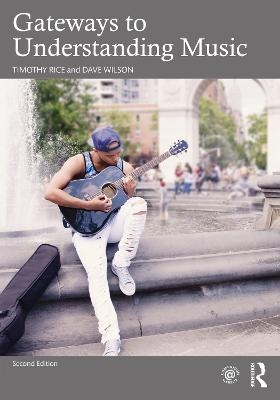
Gateways to Understanding Music
Routledge (Verlag)
978-1-032-21629-4 (ISBN)
Gateways to Understanding Music, Second Edition, explores music in all the categories that constitute contemporary musical experience: European classical, popular, jazz, and world music. Covering the oldest forms of human music making to the newest, this chronology presents music from a global rather than a Eurocentric perspective. Each of 60 "gateways" addresses a particular genre, style, or period of music. Every gateway opens with a guided listening example that unlocks a world of music through careful study of its structural elements. How did the piece come to be composed or performed? How did it respond to the social and cultural issues at the time, and what does that music mean today? Students learn to listen to, explain, understand, and ultimately value all the music they encounter in their world.
New to this edition is a broader selection of musical examples that reflect the values of diversity, equity, and inclusion advocated by North American universities. Eight gateways have been replaced. A timeline of gateways helps students see the book’s historical narrative at a glance.
Features
Values orientation - Diverse, equitable, and inclusive approach to music history.
All genres of music - Presents all music as worthy of study, including classical, world, popular, and jazz.
Global scope within a historical narrative - Begins with small-scale forager societies up to the present, with a shifting focus from global to European to American influences.
Recurring themes - Aesthetics, emotion, social life, links to culture, politics, economics, and technology.
Modular framework - 60 gateways - each with a listening example - allow flexibility to organize chronologically or by the seven themes.
Consistent structure - With the same step-by-step format, students learn through repeated practice how to listen and how to think about music.
Anthology of scores - For those courses that use the textbook in a music history sequence.
Gateways to Understanding Music continues to employ a website to host the audio examples and instructor’s resources.
Timothy Rice is Distinguished Professor, Emeritus, and founding director of the Herb Alpert School of Music at the University of California, Los Angeles (UCLA). Dave Wilson is Senior Lecturer in Music at the New Zealand School of Music—Te Kōkī, Te Herenga Waka—Victoria University of Wellington.
Introduction / PART I: MUSIC HISTORY TO 1500 CE / Chapter 1: Music of Small-Scale Societies / Chapter 2: Ancient and Medieval Religious Music / Chapter 3: Ancient and Medieval Secular Music / PART II: MUSIC HISTORY FROM 1500 TO 1890 / Chapter 4: Music from the European Age of Discovery (1500–1600) / Chapter 5: Music from the Age of Global Commerce (1600–1750) / Chapter 6: Music from the Age of Enlightenment and Revolution (1750–1815) / Chapter 7: Music from the Early Nineteenth Century (1815–1850) / Chapter 8: Music from the Late Nineteenth Century (1850–1890) / PART III: MUSIC HISTORY IN THE AGE OF RECORDINGS / Chapter 9: Music from the Turn of the Twentieth Century (1890–1918) / Chapter 10: Music from the Interwar Period (1918–1939) / Chapter 11: Music during World War II and its Aftermath (1939–1950) / Chapter 12: Music from an Age of Disenchantment and Protest (1950–1975) / Chapter 13: Music and Community (1975–1994) / Chapter 14: Music Today / Where Will You Go from Here? / Glossary / Sources / Index
| Erscheinungsdatum | 17.11.2022 |
|---|---|
| Zusatzinfo | 60 Tables, color; 48 Line drawings, color; 287 Halftones, color; 335 Illustrations, color |
| Verlagsort | London |
| Sprache | englisch |
| Maße | 210 x 280 mm |
| Gewicht | 1420 g |
| Themenwelt | Kunst / Musik / Theater ► Musik ► Klassik / Oper / Musical |
| ISBN-10 | 1-032-21629-8 / 1032216298 |
| ISBN-13 | 978-1-032-21629-4 / 9781032216294 |
| Zustand | Neuware |
| Haben Sie eine Frage zum Produkt? |
aus dem Bereich


